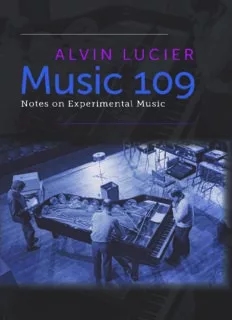
Music 109: Notes on Experimental Music PDF
Preview Music 109: Notes on Experimental Music
music 109 M u s i c 1 0 9 Notes on Experimental Music Alvin Lucier Foreword by robert Ashley Wesleyan University Press Middletown, Connecticut wesleyan university press Middletown CT 06459 www.wesleyan.edu/wespress © 2012 Alvin Lucier All rights reserved Manufactured in the United States of America Designed by Eric M. Brooks Typeset in Whitman and Calluna Sans by Passumpsic Publishing Wesleyan University Press is a member of the Green Press Initiative. The paper used in this book meets their minimum requirement for recycled paper. Sample of Drumming score by Steve Reich, copyright 1973 by Hendon Music, Inc. Reprinted by permission. Library of Congress Cataloging-in-Publication Data Lucier, Alvin. Music 109: notes on experimental music / Alvin Lucier; foreword by Robert Ashley. pages cm Includes index. isbn 978-0-8195-7297-4 (cloth: alk. paper)— isbn 978-0-8195-7298-1 (ebook) 1. Lucier, Alvin. 2. Avant-garde (Music) I. Title. ml410.l8973a3 2012 780.92—dc23 2012008721 5 4 3 2 1 Again for wendy & amanda And for susan & sue-ellen contents Foreword by Robert Ashley : ix 1 Symphony : 1 2 Studio Fonologico : 5 3 Indeterminacy : 12 4 Graphic Notation : 23 5 Town Hall : 27 6 Rose Art Museum : 44 7 Cage and Tudor : 56 8 Sonic Arts Union : 71 9 Bell Labs : 94 10 Lenses, Intervals : 99 11 Tape Recorders : 103 12 Repetition : 109 13 Prose : 126 14 The Piano : 128 15 Long String Instrument : 144 16 Recording : 150 17 Opera : 154 18 Words : 169 19 Voices : 177 20 String Quartets : 182 Author’s Note : 201 Index : 203 foreword Music 109 is a thorough, modern history of a particular group of composers and their work. This history begins in the 1950s and ends roughly in the 1980s. In colleges and universi- ties where the history of contemporary music is part of the cur- riculum, this book will solve many teachers’ problems about what ideas, what composers, and what compositions are important to understand from that history. What Alvin Lucier presents so clearly here, with quotations from scores, will make a classroom discussion of those ideas easy. We are in the time of what young composers now speak of as the music that has influenced their ideas. The study begins after the time of Harry Partch, Conlin Nancarrow, Henry Cowell, and Virgil Thompson. But even with its attention solely to the music of the past fifty years, it takes us to composers and compositions that for many younger musicians are almost legendary—compo- sitions that everybody has heard, or heard about, but that in most cases have not been studied. As we read, we discover that many of these compositions and the ideas under discussion have not previously been understood as coming from a common purpose or shared idea. In this way, the book is a serious academic history, but Lucier relates these ideas to us in the form of stories, talking to us as he talked to his stu- dents. He is never ironic about what he is doing. His enthusiasm is clear and warm hearted; this music means something to him. Many of the compositions discussed here, and the ideas they represent, remind me of times I have spent with Alvin. I read
Description: